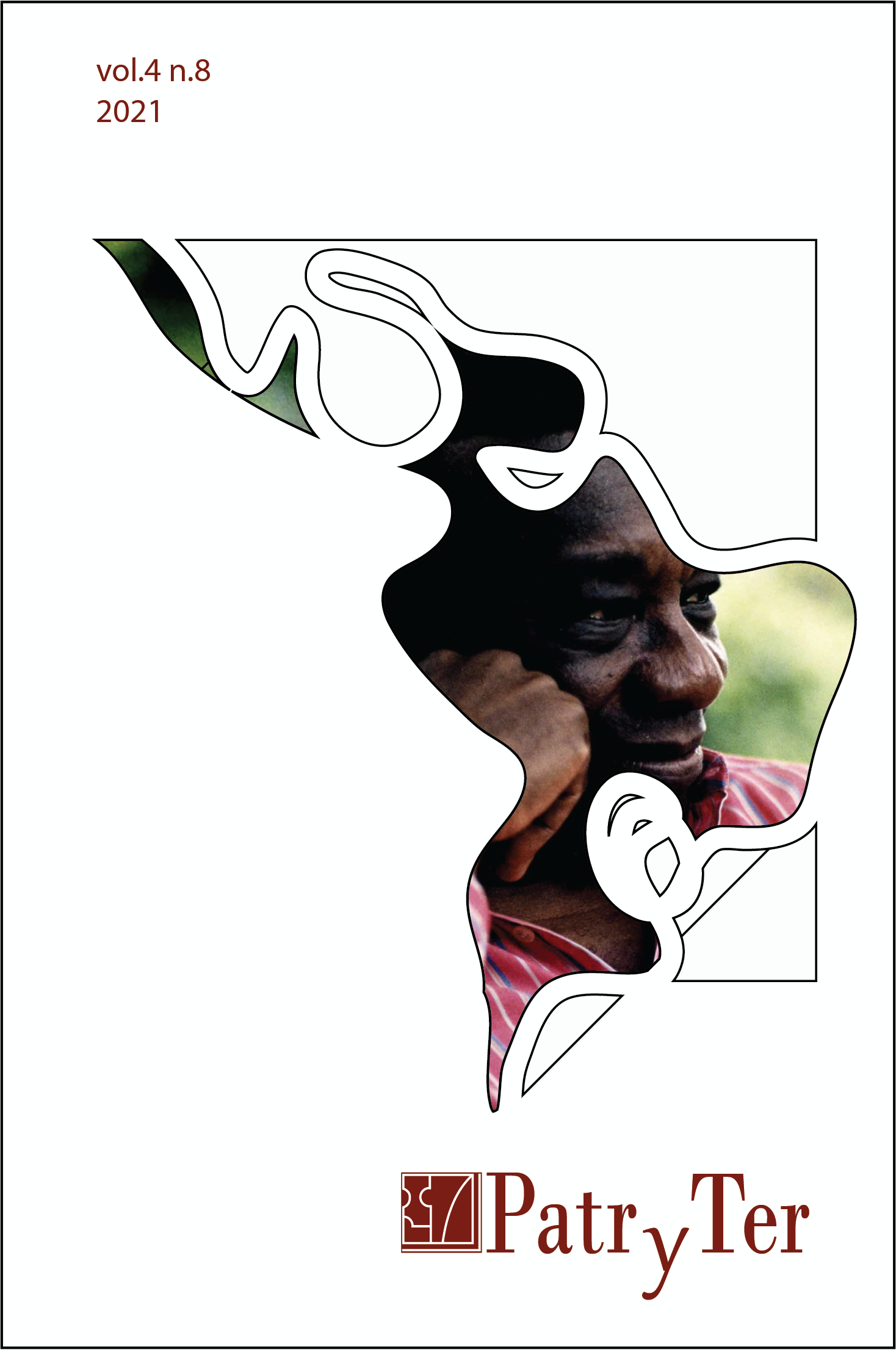City poetics in Carlos Drummond de Andrade (Brejo das Almas)
(Brejo das Almas)
DOI:
https://doi.org/10.26512/patryter.v4i8.31245Keywords:
Drummond. Brejo das Almas. modernity. city. Geography. literature.Abstract
This article is part of the studies that relate geography and literature and aims to analyze the book “Brejo das Almas”, published in 1934 by Carlos Drummond de Andrade, from the perspective of urban living in modernity. To do so, we analyzed the geographical characteristics of the city of Brejo das Almas (currently Francisco Sá), using the census data and comparing its objective reality with the subjective expression of the author. Thus, we seek to go beyond the concept of representation, which is limited to a compilation or description of the space contained in literature. In this way, we seek to take a “geo-literary” look at the interior of Minas Gerais based on Drummond's work, understanding the literary work and the geographical space as a whole. We find in Drummond's poetry about the interior of Minas the strength of the contradictions of modernity and in Brejo das Almas the motto of a poetic expression that integrates urban space as a dimension of the existence.
Downloads
References
Adorno, T. (2003). Notas de literatura I. São Paulo: Duas Cidades/Editora 34.
Andrade, C. (2002). Alguma Poesia. Rio de Janeiro: Record.
Andrade, C. (2013). Brejo das Almas. São Paulo: Companhia das Letras.
Azevedo, A. (1992). Vilas e cidades do Brasil colonial: ensaio de geografia urbana retrospectiva. Terra Livre, 10, 23-78. https://www.agb.org.br/publicacoes/index.php/terralivre/article/view/113/111
Baudelaire, B. (1985). As flores do mal. Rio de Janeiro: Nova Fronteira.
Baudelaire, B. (2006). Les fleurs du mal. Paris: Pocket.
Baudelaire, B. (2010). O esplim de Paris: pequenos poemas em prosa. São Paulo: Martin Claret.
Berman, M. (2007). Tudo que é sólido desmancha no ar: a aventura da modernidade. São Paulo: Companhia das Letras.
Bauman, Z. (1998). O mal-estar da pós-modernidade. Rio de Janeiro: Zahar.
Bauman, Z. (2004). Amor líquido: sobre a fragilidade dos laços humanos. Rio de Janeiro: Jorge Zahar.
Brosseau, M. (1996). Des romans géographes. Paris: L’harmattan.
Camilo, V. (2000). Uma poética da indecisão: Brejo das Almas. Novos Estudos CEBRAP, 57, 37-58. http://novosestudos.uol.com.br/produto/edicao-57/
Cândido, A. (2011). Inquietudes na poesia de Drummond. In A. Candido. Vários Escritos (pp. 69-99). Rio de Janeiro: Ouro sobre Azul.
Corrêa, R. (1980). Da Nova Geografia à Geografia Nova. Revista de Cultura Vozes. Geografia e sociedade: os novos rumos do pensamento geográfico, 74(LXXIV), 5-12. Petrópolis: Vozes.
Gledson, J. (1981). Poesia e poética de Carlos Drummond de Andrade. São Paulo: Duas Cidades.
Instituto Brasileiro de Geografia e Estatística. (1940). Recenseamento Geral do Brasil (1º de Setembro de 1940). Série Regional. Parte XIII: Minas Gerais. Tomo 2. https://biblioteca.ibge.gov.br/visualizacao/periodicos/65/cd_1940_p13_t2_mg.pdf
Instituto Brasileiro de Geografia e Estatística. (2003). Metodologia do Censo Demográfico 2000. Rio de Janeiro: IBGE. https://biblioteca.ibge.gov.br/index.php/biblioteca-catalogo?view=detalhes&id=284173
Instituto Brasileiro de Geografia e Estatística. (2017). IBGE Cidades. https://cidades.ibge.gov.br/
Lafaille, R. (1989). Départ: Géographie et poésie, The Canadian Geographer, 33(2), 118-130. https://doi.org/10.1111/j.1541-0064.1989.tb00893.x
Lévy, B. (2006). Geógraphie et littérature: une synthèse historique. Le Globe. Revue genevoise de géographie, 146, 25-52. https://www.persee.fr/doc/globe_0398-3412_2006_num_146_1_1513
Lévy, B. (1997). Géographie culturelle, géographie humaniste et littérature: Position épistémologique et méthodologique. Géographie et Cultures, 21, 27-44. https://www.researchgate.net/publication/294601485_Geographie_culturelle_geographie_humaniste_et_litterature_Position_epistemologique_et_methodologique
Lindón, A. (2009). La construcción socioespacial de la ciudad: el sujeto cuerpo y el sujeto sentimiento. Revista Latinoamericana de Estudios sobre Cuerpos, Emociones y Sociedad, 1, 6-20. http://www.relaces.com.ar/index.php/relaces/article/viewArticle/4
Marinho, S. (2010). Um homem, um lugar: geografia da vida e perspectiva ontológica. (Tese de Doutorado em Geografia). Universidade de São Paulo, São Paulo.
Scarlato, F. & Costa, E. (2017). A natureza do urbano. Confins, 30. https://doi.org/10.4000/confins.11676
Villaça, A. (2013). Desejos tortos. In C. D. Andrade. Brejo das Almas (pp. 47-57). São Paulo: Companhia das Letras.
Downloads
Published
Issue
Section
License
Copyright (c) 2021 PatryTer

This work is licensed under a Creative Commons Attribution-NonCommercial-NoDerivatives 4.0 International License.
Please be advised that Revista Patryter is licensed under a Creative Commons Attribution-NonCommercial-NoDerivatives 4.0 International License (CC BY-NC-ND 4.0) https://creativecommons.org/licenses/by-nc-nd/4.0/deed.en
Authors who publish in the PatryTer Magazine agree to the following terms:
- Authors retain the copyright and grant the journal the right of first publication, the work being simultaneously licensed under the Creative Commons Attribution-NonCommercial-NoDerivatives 4.0 International License (CC BY-NC-ND 4.0) which allows the sharing of the work with recognition of the authorship of the work and initial publication in this journal.
- The contribution is original and unpublished and is not being evaluated for publication by another journal. When submitting the article, authors should attach as a supplementary document a Letter addressed to the PatryTer's Editor, indicating the academic merits of the submitted work (relevance, originality and origin of the article, that is, from what type of research]. This letter must be signed by all authors.
- Authors assign the copyright of the work that they present to the Editorial Board of PatryTer Magazine, which may serve the article in the PatryTer Magazine and in public and private databases in Brazil and abroad.
- Authors declare that they are fully responsible for the entire contents of the contribution that they submit to the Editorial Board of PatryTer Magazine.
- Authors declare that there is no conflict of interest that could interfere in the impartiality of the scientific papers submitted to the PatryTer Magazine Editorial Board.
- Authors are authorized to take additional contracts separately, for non-exclusive distribution of the version of the work published in this journal (eg publish in institutional repository or as a book chapter), with acknowledgment of authorship and initial publication in this journal.
Authors are allowed and encouraged to publish and distribute their work online (eg in institutional repositories or on their personal page) at any point before or during the editorial process, as this can generate productive changes as well as increase the impact and the citation of the published work (See The Effect of Free Access).



